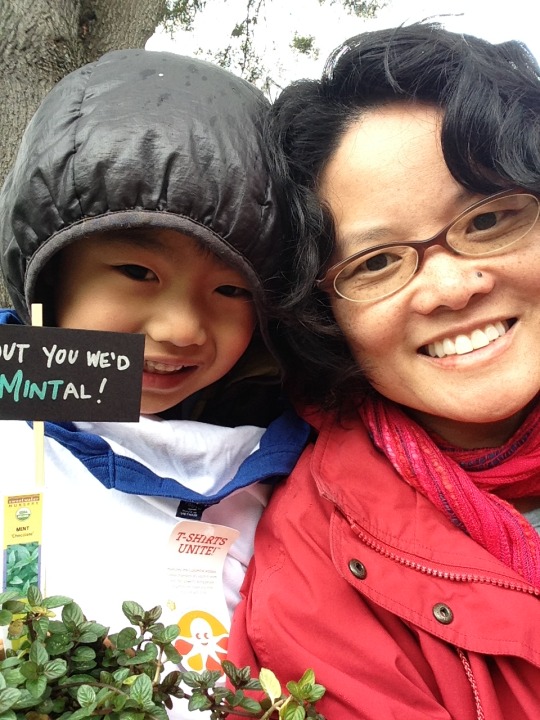By: Karen Chow

The author with her six-year-old son Kai.
As an Asian American parent who is proud of being culturally Chinese American and racially Asian, I consciously aim to be socially progressive and pass those values on to my son. Naturally, it offends and pains me to hear my 6-year-old boy say or do things that signal a rejection of his identity. Sometimes this happens in obvious ways like when he says things such as, “I don’t want to speak Chinese,” or rejects eating Asian foods outside of rice (preferably white), nori seaweed sheets, and Vietnamese lemongrass pork. He also refuses to eat most vegetables, which crushes my Asian sensibilities.
However, sometimes there are less obvious behaviors that I find deeply unsettling including a longstanding battle of wills I’ve recently engaged in with my son over his refusal to participate in his swimming class.
A brief history: since he was two years old, we have tried children’s swim classes at popular pricy facilities, including La Petite Baleen and the San Francisco Presidio YMCA. Each time, we hit a wall after he made only incremental progress in his swimming skills: he refuses to participate and cooperate with the lessons once he is asked to put his head underwater.
After he started kindergarten, we took a hiatus from swimming, when team sports like playing soccer and basketball with his friends held more allure. But when summer approached, my sense of motherly duty to ensure that my child has the skills to swim to the surface and safety should he fall into a body of water kicked in.
Before we started a travel-packed summer to Lisbon, Vietnam, and Taipei, I signed him up for two weeks of swimming class at a San Francisco Parks and Recreation pool facility, to begin after we’d returned home. During our travels, he had about five opportunities to go into beaches and pools. Every time, he eagerly enjoyed it and at our final pool outing in Taipei he made a major leap in progress—he voluntarily put his head below water and flapped his arms and legs underwater for about 5 seconds at a time. My spirits were as buoyant as his body.
However, only six days later, back home in San Francisco, when we started Day 1 of the swimming lessons, Kai was timid and wary. He weepily refused to even approach the pool. I was beside myself with frustration and all my reasoning with him went nowhere. He would not budge. I caught myself escalating my threats, adding to the list of privileges I would revoke if he did not participate in the lessons not (“no iPad. No screentime. No playdates”), as my anger boiled.
When I finally calmed down and traced the source of my anger, I realized that it came from my fear that my son was not just rejecting swimming, he was rejecting his identity and manifesting internal racism. You see, about 95% of everyone in and around the pool was racially Asian, and mostly ethnically Chinese. That includes students, the swim instructors (who are high school city swim team members), the staff, and parents.
And then I remember that when I was 9 years old, my mother enrolled my brother and me in summer swim lessons at the local high school in our L.A./San Gabriel Valley suburb of Hacienda Heights. The first summer, I went into the water, but then fearfully and silently refused to let go of the side of the pool or participate in lessons. The summer after that, we were enrolled again in swim lessons with two other kids who were the children of parents my mother had met in her job as our school district multilingual liaison. The kids, a brother and his younger sister, were recent Chinese Taiwanese immigrants and spoke very little and heavily accented English. They wore uncool swimsuits that screamed “F.O.B” to Chinese Americans like my brother and me. They smelled different.
We ostracized them and said cruel things about them under our breath. We laughed scornfully at them in public when they did or said things that revealed their cultural ignorance of American suburban protocols. Later, this boy would become one of my brother’s best friends (they are still good friends to this day) but I cannot forget our initial cruelty towards and rejection of them. And then I realize: my anger towards my son’s rejection of his swimming lessons at the San Francisco pool and the people there is anger towards my younger self. Swimming lessons for me have painful associations with being both the timid mute fearful Asian girl, a negative characterization of being Asian that I have worked hard to leave behind, as well as the shame of having once been the internalized racist who disdained “FOB” Asian immigrants because of the fear of being associated with them.
When I step back, I can see that there are other, non-racial, factors that lead to my son’s fear and discomfort—he was never asked if he wanted to take these swim lessons and his indignation at being forced to participate fuels his resistance. The pool is very big and even the shallow end looks deep; many kids are in the pool and the scene is a bit chaotic with students of different levels splashing, kicking, and swimming; besides the instructors in the water, there are additional instructors outside the water hovering over the students, animatedly pointing or demonstrating techniques, and speaking or yelling loudly.
In these calmer moments, I can remember that my son loves his Chinese relatives as well as many of my Asian (recent immigrant, international, and Asian American) students he’s met and interacted with; he enjoyed being in Vietnam and Taipei. But inside me, there is still a deep-seated feeling of hurt, rejection, and resentment that is hard to shake, and I am not willing to give up battling my son’s stubborn will. We have gone back on Day 2 and Day 3 of swim lessons and despite my cajoling, threats, and even attempts by kind staffers to help my son feel more comfortable, he has continued to resist and refuse to even dip his toe in the pool.
I hope that now recognizing this will make it easier for me to be a compassionate parent if my son again refuses to participate in Day 4 and more of swim lessons. But it won’t be easy, because for now, I stubbornly can’t let go of my hope and vision for the outcome of these lessons: That he will relent and agree to descend the ladder into the warm pool, and trust the young teenage Chinese American swim teacher. That he will not be discomforted by the many Asian bodies around him. That he will discover and be delighted by the buoyancy of his body and the miracle of his ability to float and propel himself in the water, free of the burdens of his mother’s disappointment and shame of her past.
About the Author: In addition to being the mom of a 6 year old boy who delights and challenges her (sometimes all at once), Karen Chow is a professor of English, Women’s Studies, and Asian American Studies at De Anza College. When she’s not teaching, hanging out with her family, reading, cooking, doing yoga, and going on long walks, she is board president of the Richmond District Neighborhood Center, serves on the editorial board of Asian American Literature: Discourses and Pedagogies, and is a member of Asian Women United.
